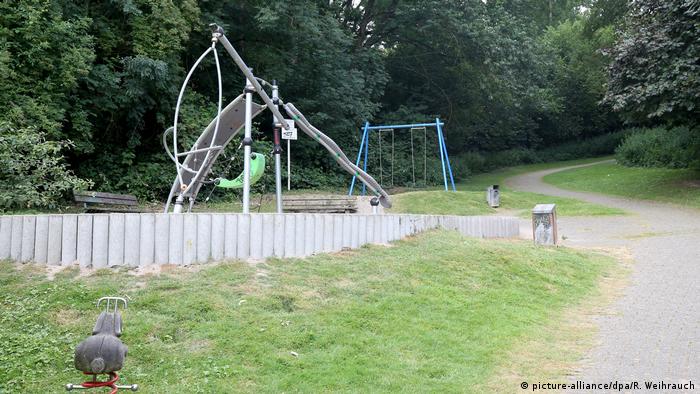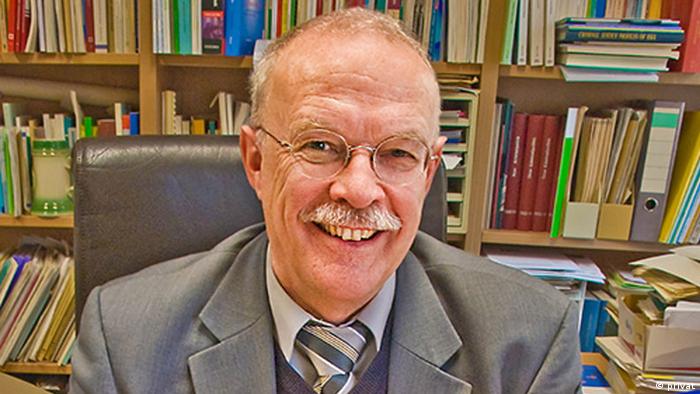After an alleged rape of two twelve-year-old may have been involved should be discussed in Germany on the reduction of criminal responsibility. An interview with the criminal lawyer Frieder Dünkel.

In the vicinity of this Playground in Mülheim a young woman is being robbed, and allegedly raped and
DW: In Germany, one is from the age of 14 the age of criminal responsibility. Since when is that so?
Professor Frieder Dünkel: Since 1923, with a break during the Nazi time. The national socialists had set the age limit to twelve years, since then, happen to very bad history. Since 1953, with the reform of the judiciary again, we have the limit at 14 years, and this is actually the European Standard.
There are also countries, where children and young people later the age of criminal responsibility?
In Belgium and Poland, the criminal responsibility at 16 years, begins in the Scandinavian countries for 15 years. For the vast majority in Europe for 14 years – in the Eastern European countries, Italy, Spain and Germany. And then there are some countries with a previous criminal responsibility, in particular, the English-speaking countries, such as Ireland. There, the children are ten years of age of criminal responsibility, however, with certain reservations, as regards the sanctioning. You can of course apply the criminal responsibility relatively early on, but then the sanctions with youth penalty or a custodial sentence of under say. In Switzerland, for example, a child can get with ten years of an educational measure by the juvenile court. It then has to do community work or training courses.
After the rape, in Mülheim, at the two twelve-year-old may have been involved should be, there is now a debate in Germany whether you should reduce the criminal responsibility. How do you rate this?
If they stuck a twelve-year-old to juvenile prison, this would have fatal consequences. These prisons are occupied to 90 per cent with young men, older than 18 years, and the Boy would then be the ideal victim. The one cannot, in good conscience. Young people with 14 or 15 years in prison, the absolute Underdogs and most vulnerable. Because you have to be careful that these are not needs of the Elderly miss.
If it is the resocialization writes to the flags, not suits.
Exactly. The debate is so inclined, as it was 20 years ago already times. It was also at that time already, the children of crime increases and the perpetrators of violence would be getting younger and younger. Ten years later, it has seen of the alleged perpetrators of violence, nothing more. Children crime usually means the property offences, shoplifting or black drive. Therefore there is no place for the criminal law since. And the state is not powerless. We have book a youth welfare law, which provides for a number of measures to Intervention by the family judge according to the Civil law. The judge may also have a briefing in a home, possibly even in a closed home, what we are trying to avoid, of course. In Germany there are about 300 places, where young people are safely housed and can not escape.

Professor Frieder Dünkel has written a study of the penitentiary system in a European comparison
The criticism is that there wasn’t enough staff in the youth welfare offices.
A few years ago, there were some cases of neglect of children, as a result it has introduced a number of 50 children and young people per social worker. But this is actually a Problem in some regions and Hotspots, all the more. The staff recognized would certainly be much easier than to modify the criminal responsibility. Especially as the consequences in criminal law would be dramatic and disproportionate. You try to do it in this age, more with educational projects and activities. There are of course a variety. Not only of the youth offices – and the youth is predominantly a non-profit, and privately organized Clubs and projects. For example, there are Anti-violence-training. This prevention work should be strengthen.
Another point of criticism is that in the mülheim case, the youth welfare office is ringing at the front door of a twelve-year-old, the family but just do not open.
The youth welfare office is going to be hard for sure, with a bit of more rigid methods. But of course, you can obtain a court order. You can take the youth into custody. This is even explicitly in the youth welfare act, in that such a temporary detention for a few weeks is possible. The set of instruments is there. The youth welfare office can’t talk your way out of that, it says, we have not opened the door. Then you have to draw the next card, so the Family is switched on.
But, again, the statistics speak a different language. The Numbers of violent acts by teenagers and children go back.
The police says. But not only, if we look at the Police crime statistics, but also in the investigations that illuminate the dark field. It will not be displayed many deeds, but also because adolescents and young adults, a significant decrease in violence. Of course, we have in the media, an Outcry, if, as a fact, as in Mülheim happens. But these are so rare individual cases that do not happen every day. It is a risk we can never avoid completely, but, thank God, is not our everyday life. You should refrain from a criminal policy strategy, the exchange nevertheless, and to not induce any snap shots can.
The debate is of course not fired yet, because it is clear that the five young people to the Germans, but to the Bulgarians.
Yes, but also for the German law applies. Of course you have to look at what is going on in the Integration wrong, why they are taken in Germany or whether you have indicated your freedom miss. This is all speculation. But nevertheless, there is no reason to respond now hysterical, because even in the case of these offences, the foreigners are not involved dramatically higher. The majority of the crimes committed by foreigners, thefts, and other violent acts are the absolute exception. In connection with the discussion of criminal responsibility, one must ask, of course, the question of the maturity of the child. Also a ten-year-olds is broadly clear what is right and what is wrong. But to act on it is something else again. And there are situational stories that do not pass spontaneously and will probably be planned. In such situations young people are of course still less able to control mechanisms turn on.
Your conclusion is A little bit more Composure and the youth welfare offices have to do their Job…
…and then decided to act. The integration of efforts to strengthen the existing law is to be applied. The reputation under the criminal law must be the very last. Prior to this, the family law and the youth protection always comes. The are the adjusting screws, where you have to turn.
Professor Frieder Dünkel is a criminal lawyer and criminologist, and was holder of the chair for criminology at the University of Greifswald.
The conversation with Oliver Pieper led.